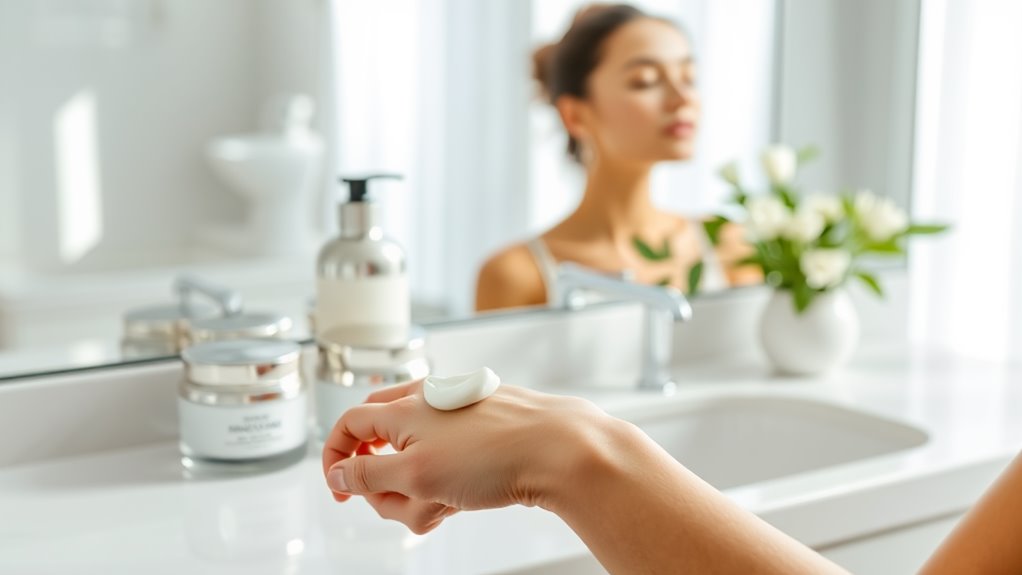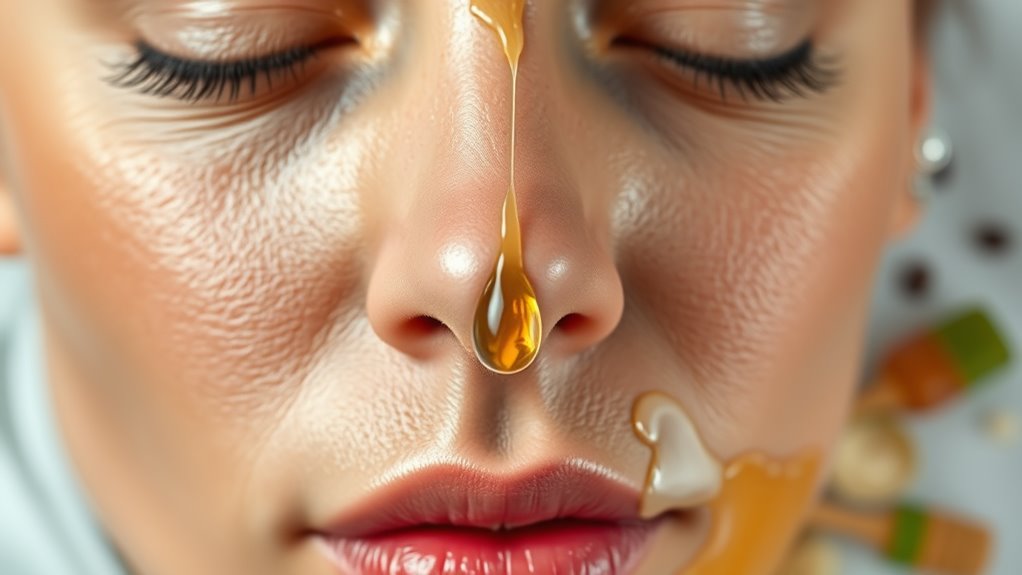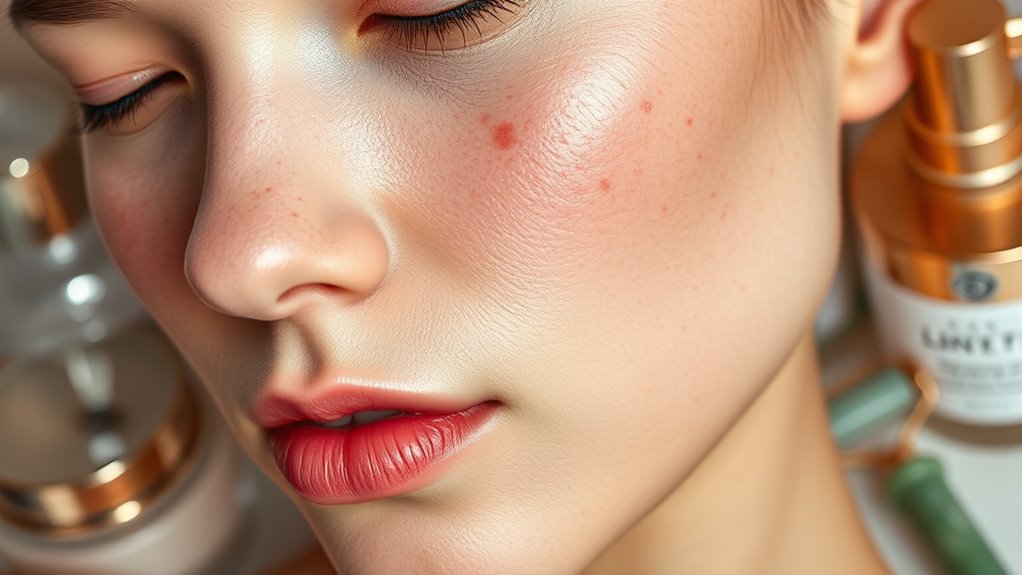How I Cleared My Acne Without Expensive Products
To clear your acne without expensive products, start by identifying your specific triggers, such as high-glycemic foods and dairy. Incorporate natural remedies like turmeric and tea tree oil for their anti-inflammatory properties. Maintain a consistent skincare routine with daily cleansing, regular exfoliation, and moisturizing. Address stress through mindfulness and exercise, as it can exacerbate breakouts. Lastly, cultivate a positive mindset to reduce stress levels, which can lead to clearer skin. Discover effective techniques that can enhance your journey.
Key Takeaways
- Adopt a whole-food diet while avoiding high-glycemic foods and dairy to improve skin health over time.
- Utilize natural remedies like turmeric and tea tree oil for their anti-inflammatory and antibacterial properties.
- Maintain a consistent skincare routine with daily cleansing, exfoliation, and moisturizing to prevent flare-ups.
- Incorporate stress management techniques like mindfulness and regular exercise to reduce stress-related breakouts.
- Foster a positive mindset through daily affirmations and a supportive environment to enhance emotional well-being and skin health.
Understanding My Acne Triggers
Identifying your acne triggers is crucial for effective management and prevention. You’ll want to assess factors such as diet, stress levels, and skincare products.
Research indicates that high-glycemic foods and dairy can exacerbate acne, so monitoring your intake can be one of your affordable acne tips. Additionally, stress releases hormones that may lead to increased oil production, contributing to breakouts.
Keeping a journal may help you correlate flare-ups with specific events or products. Pay attention to your skincare routine; certain ingredients can irritate your skin, worsening acne. Moreover, avoiding high-glycemic foods can significantly improve your skin condition over time.
Natural Remedies That Worked for Me
When exploring natural remedies for acne, consider the benefits of herbal face masks and dietary changes. Research indicates that certain herbs can reduce inflammation and promote healing, while a balanced diet may improve skin health. Additionally, avoiding acne trigger foods can be crucial in achieving clearer skin. Implementing these strategies could significantly enhance your overall skin condition.
Herbal Face Masks
Many people searching for effective acne treatments overlook the potential of herbal face masks. These masks leverage the anti-inflammatory and antibacterial properties of natural ingredients like turmeric, neem, and tea tree oil.
Research indicates that turmeric contains curcumin, which can reduce acne lesions and redness. Neem, known for its antimicrobial effects, can help unclog pores and minimize outbreaks. Additionally, tea tree oil has been shown to significantly reduce acne severity due to its ability to combat Propionibacterium acnes bacteria.
When you apply these masks regularly, you’re not just treating existing acne; you’re also preventing future breakouts. Incorporating these herbal remedies into your skincare routine can enhance your overall skin health while promoting a balanced complexion without the need for harsh chemicals.
Dietary Changes Benefits
Making dietary changes can significantly impact your skin health, especially when it comes to managing acne.
Research indicates that high-glycemic foods, such as white bread and sugary snacks, can exacerbate acne by increasing insulin levels, leading to elevated sebum production.
Opt for a diet rich in whole foods, including fruits, vegetables, and healthy fats, which provide essential nutrients and antioxidants that promote skin health.
Omega-3 fatty acids, found in fish and flaxseed, may reduce inflammation and improve overall skin condition.
Additionally, staying well-hydrated helps flush toxins from your body, which can also aid in reducing breakouts.
The Importance of a Consistent Skincare Routine
A consistent skincare routine is crucial for managing acne effectively.
Daily cleansing removes impurities, while moisturizing maintains skin balance and prevents over-drying.
Additionally, regular exfoliation enhances skin renewal and helps prevent clogged pores, contributing to clearer skin over time. Incorporating affordable remedies into your routine can further support your journey to clear skin.
Daily Cleansing Ritual
Although it might be tempting to skip your skincare routine when you’re busy, a consistent daily cleansing ritual is crucial for maintaining healthy skin and managing acne. Cleansing removes dirt, oil, and impurities that can clog pores and exacerbate breakouts.
Research indicates that a gentle, pH-balanced cleanser effectively maintains skin integrity without disrupting the natural barrier. Aim to cleanse twice daily—once in the morning to eliminate overnight buildup and again at night to remove the day’s pollutants.
Use lukewarm water to avoid irritation, and ensure you’re applying the cleanser with a gentle circular motion for adequate coverage. Consistency is key; your skin needs this daily attention to prevent acne flare-ups and promote a clearer complexion over time.
Moisturizing for Balance
Moisturizing is an essential step in any skincare routine, especially for those managing acne. Proper hydration helps maintain skin barrier function, preventing overproduction of oil that can lead to breakouts.
A consistent moisturizing regimen promotes balance, ensuring your skin remains hydrated without exacerbating acne.
Consider these key points when incorporating moisturizer into your routine:
- Choose non-comedogenic products to avoid clogging pores.
- Opt for lightweight, oil-free formulas suitable for acne-prone skin.
- Apply moisturizer after cleansing to lock in hydration.
- Use ingredients like hyaluronic acid or glycerin for effective moisture retention.
- Establish a routine, applying moisturizer both morning and night for optimal results.
Regular Exfoliation Benefits
Maintaining a consistent skincare routine involves more than just moisturizing; regular exfoliation plays a vital role in achieving clear skin. By removing dead skin cells, exfoliation prevents clogged pores, reducing the likelihood of acne formation.
Additionally, it promotes cellular turnover, allowing fresh, healthy skin to emerge. Research indicates that regular exfoliation can enhance the efficacy of topical treatments, as it improves their absorption.
You should consider incorporating both physical and chemical exfoliants into your regimen, tailored to your skin type. For example, alpha-hydroxy acids (AHAs) are particularly beneficial for oily skin, while beta-hydroxy acids (BHAs) can target deeper impurities.
Ultimately, consistent exfoliation not only clears existing blemishes but also helps prevent future outbreaks, leading to a smoother, more radiant complexion.
Dietary Changes That Made a Difference
When you consider the impact of diet on skin health, you might be surprised by how significant certain dietary changes can be in managing acne.
Research indicates that specific nutrients and food choices can influence inflammation and hormonal balance, both of which are critical in acne development. Additionally, certain unseen food triggers may exacerbate skin issues, making it essential to identify and avoid them.
Here are some dietary adjustments that can lead to clearer skin:
- Increase omega-3 fatty acids (found in fish and flaxseeds)
- Consume antioxidant-rich fruits and vegetables
- Limit high-glycemic index foods (like white bread and sugary snacks)
- Reduce dairy intake (especially skim milk)
- Stay hydrated with plenty of water
Stress Management Techniques
Dietary changes can significantly improve skin health, but managing stress is equally important in the fight against acne. Stress triggers hormonal fluctuations that can exacerbate acne. Incorporating effective stress management techniques can help you maintain clearer skin and overall well-being. Additionally, understanding how stress contributes to skin issues can empower you to take proactive steps in your skincare routine.
| Technique | Evidence-Based Benefit |
|---|---|
| Mindfulness | Reduces cortisol levels, aiding skin health |
| Exercise | Enhances mood and reduces stress hormones |
| Adequate Sleep | Supports skin regeneration and hormonal balance |
Implementing these techniques can significantly reduce stress and its impact on your skin. Make them a part of your daily routine, and you’ll likely notice a positive change in both your mental state and your complexion.
Embracing a Positive Mindset
Cultivating a positive mindset is crucial for anyone dealing with acne, as it can influence both emotional well-being and skin health. Research indicates that a positive outlook can reduce stress, which in turn may decrease inflammation and breakouts.
Here are some strategies to foster this mindset:
- Practice daily affirmations**** to reinforce self-worth.
- Engage in mindfulness meditation**** to enhance emotional resilience.
- Surround yourself with supportive individuals who uplift you.
- Focus on your strengths and accomplishments instead of perceived flaws.
- Set realistic goals**** for skin improvement, celebrating small victories.




